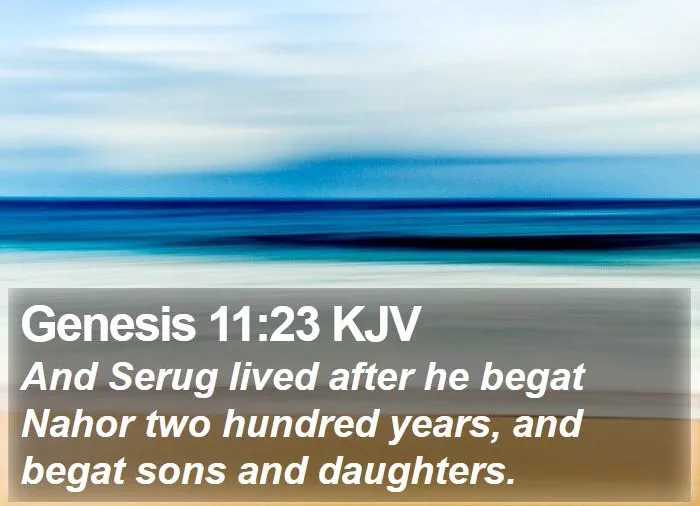Read the Daily Bible Verse Genesis 11:23 To Strengthen Your Spiritual Journey.
Genesis 11:23 is a verse in the Bible that is part of the genealogy of Shem, one of Noah’s sons. This verse specifically mentions Serug, a descendant of Shem, and his lifespan after the birth of his son Nahor. The verse reads: “And Serug lived after he begat Nahor two hundred years, and begat sons and daughters” (Genesis 11:23, KJV). This verse, while seemingly straightforward, holds deeper significance when examined in the context of biblical history and theology.
The Context on Genesis 11:23 KJV
To fully understand Genesis 11:23, it is essential to consider its context within the Bible. Genesis 11 is part of the larger narrative that follows the Great Flood and the Tower of Babel. The chapter begins with the story of the Tower of Babel, where humanity’s pride leads to God’s intervention, resulting in the confusion of languages and the scattering of people across the earth. Following this event, the narrative shifts to the genealogy of Shem, tracing the lineage from Shem to Abram (later known as Abraham).
The genealogies in Genesis serve several purposes. They provide a historical record of the descendants of key biblical figures, establish the continuity of God’s covenant promises, and highlight the faithfulness of God in preserving a remnant through whom His redemptive plan would unfold. Genesis 11:23, therefore, is not just a record of Serug’s lifespan but a link in the chain that leads to the birth of Abraham, the father of the Israelite nation.
The Genesis 11:23 Meaning
At first glance, Genesis 11:23 appears to be a simple genealogical statement. However, it carries significant theological implications. The verse emphasizes the longevity of Serug, who lived for 200 years after the birth of Nahor and had other sons and daughters. This extended lifespan is characteristic of the antediluvian and early postdiluvian periods, where people lived much longer than they do today.
Theologically, the verse underscores the continuity of God’s plan through successive generations. Despite the rebellion at Babel and the dispersion of humanity, God’s purposes remain intact. The genealogy serves as a reminder that God’s covenant promises, first given to Adam and later to Noah, are being fulfilled through the line of Shem. Serug’s inclusion in this genealogy highlights the faithfulness of God in preserving a lineage through which the Messiah would eventually come.
Genesis 11:23 Application in Life
While Genesis 11:23 may seem distant from contemporary life, it offers several practical applications for believers today. First, it reminds us of the importance of family and generational faithfulness. Just as Serug was part of a lineage that led to Abraham, we too are part of a spiritual lineage. Our faith and actions can have a lasting impact on future generations.
Second, the verse encourages us to trust in God’s sovereignty and faithfulness. Despite human failures and the seeming chaos of history, God’s purposes are being accomplished. This assurance can provide comfort and hope in times of uncertainty.
Lastly, Genesis 11:23 challenges us to consider our legacy. What kind of spiritual heritage are we leaving for those who come after us? Are we living in a way that honors God and contributes to His redemptive plan?
See Also: Genesis 11:22 Meaning, Context & Commentary
Comparison with Other Biblical Texts
Genesis 11:23 can be compared with other genealogical passages in the Bible, such as those in Genesis 5 and Matthew 1. The genealogies in Genesis 5 trace the lineage from Adam to Noah, highlighting the longevity of the antediluvian patriarchs. In contrast, the genealogy in Matthew 1 traces the lineage from Abraham to Jesus, emphasizing the fulfillment of God’s promises through the coming of the Messiah.
Both genealogies serve to underscore the faithfulness of God in preserving a remnant and fulfilling His covenant promises. They also highlight the importance of each individual in God’s redemptive plan. Just as Serug played a role in the lineage leading to Abraham, each person in the genealogy of Jesus played a part in the unfolding of God’s salvation history.
Modern-Day Relevance
In today’s world, where the concept of family and generational continuity is often undervalued, Genesis 11:23 offers a countercultural perspective. It reminds us of the importance of our spiritual heritage and the impact of our faith on future generations. In a society that often prioritizes individualism and immediate gratification, this verse calls us to consider the long-term implications of our actions and the legacy we leave behind.
Furthermore, Genesis 11:23 speaks to the faithfulness of God in the midst of human frailty and failure. Despite the rebellion at Babel and the dispersion of humanity, God’s purposes were not thwarted. This assurance can provide hope and encouragement for believers facing challenges and uncertainties today.
Conclusion
Genesis 11:23, while seemingly a simple genealogical statement, holds profound theological and practical significance. It underscores the continuity of God’s redemptive plan through successive generations, highlights the importance of family and generational faithfulness, and challenges us to consider our legacy. By examining this verse in its biblical context and comparing it with other genealogical passages, we gain a deeper understanding of God’s faithfulness and sovereignty.
Genesis 11:23 Commentary
Commentaries on Genesis 11:23 provide further insights into its meaning and significance. For example, John Gill’s Exposition of the Bible notes that Serug’s extended lifespan is characteristic of the early postdiluvian period and emphasizes the continuity of God’s covenant promises. Similarly, the Enduring Word Bible Commentary highlights the importance of genealogies in tracing the lineage of key biblical figures and establishing the continuity of God’s redemptive plan.
In conclusion, Genesis 11:23 is more than just a record of Serug’s lifespan. It is a testament to the faithfulness of God in preserving a lineage through which His redemptive purposes would be fulfilled. As we reflect on this verse, may we be encouraged to trust in God’s sovereignty, value our spiritual heritage, and consider the legacy we leave for future generations.


